MEN’S BASKETBALL: A night in the Branford Pottery Studio with Isaiah Kelly ’22
Forward Isaiah Kelly ’22 took his first ceramics class during his sophomore year of high school at Pace Academy. Since then, his skill has flourished, and he now works as a studio assistant in Branford.
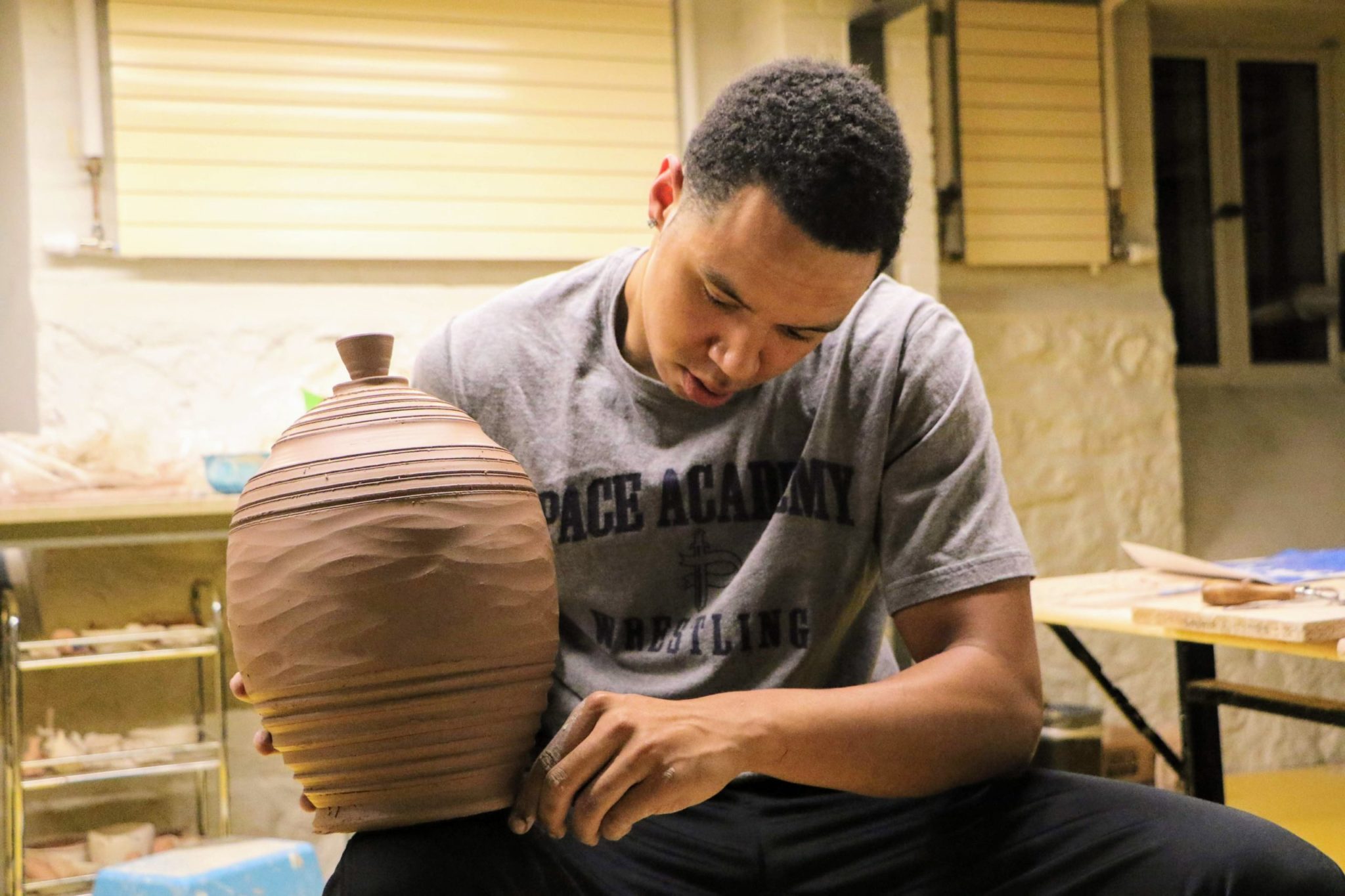
William McCormack
Exactly seven days remained until the Yale men’s basketball team opened its 2019–20 season at Stony Brook, and forwards Austin Williams ’20, Isaiah Kelly ’22 and EJ Jarvis ’23 were sitting around pottery wheels in the Branford College basement.
Practice at Payne Whitney Gym had ended about an hour earlier, but for Williams and Jarvis, practice in the Branford pottery studio had just begun. Somewhere between 7:00 and 8:00 p.m., Kelly had turned from a 6-foot-7 forward to a ceramics instructor, his knees towering over the wheel at which he worked and his hands stained by drying clay.
Kelly’s skill as a potter has blossomed since he decided to take a ceramics class during his sophomore year of high school at Pace Academy, and after finding time to work in Branford’s studio last spring, he joined as a studio assistant in the fall. Since September, he has overseen an open studio for two-hour chunks every Tuesday and Thursday night, offering instruction, producing his own work and hanging out with as many people as he can convince to drop by.
His two teammates, along with a few other students who filled the room, visited during the final week of October to learn, but also to simply socialize. Some tried their hand at throwing a pot on the wheel. Others just hung around a table in the corner, listening to music with their laptops out. Kelly, who has missed the occasional session when the team departs for weekend back-to-backs on Thursday nights, is happy the space can be a social one.
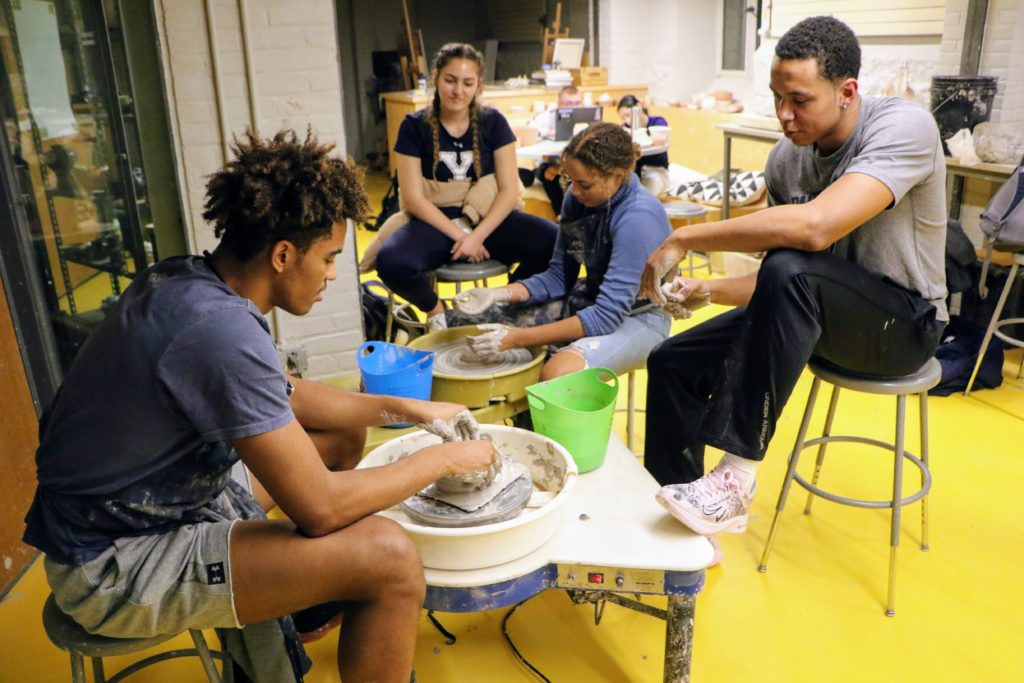
“If it’s something you know how to do and it’s a gift,” Kelly said. “You need to show it… I’m basically just trying to recruit people to hang out with and learn how to throw. I like the community. That’s the best part of having people in the studio. You’re with them all day, just jamming out, making pieces — that’s fun. Nobody likes being in there by themselves.”
Kelly, who now also occasionally works in the studio on Sundays, advertised the open hours on his Instagram in the fall, and attendance increased as a result. A senior Branford aide led a large group of 15 from the Asian American Cultural Center into the studio one time — though the room only has three pottery wheels, Kelly was satisfied with the workshop.
Before stopping by, Jarvis, who had seen Kelly publicize the free lessons on Instagram, had not done wheel throwing since he was 10. His teammate-turned-instructor sat opposite the wheel and occasionally helped shape Jarvis’s piece as it morphed from a wet baseball of moving clay into a small pot. Kelly said he always guides the first piece anyone comes to make, cupping their hands around the clay to help them gain a sense of the process, the wheel spinning and their foot on the pedal throughout.
With more practice, his assistance grows less important. He roamed the room, making conversation as he put the finishing touches on his own vase. Teaching can feel more difficult than producing pieces, like his own brown clay vessel, the size of a basketball and a half.
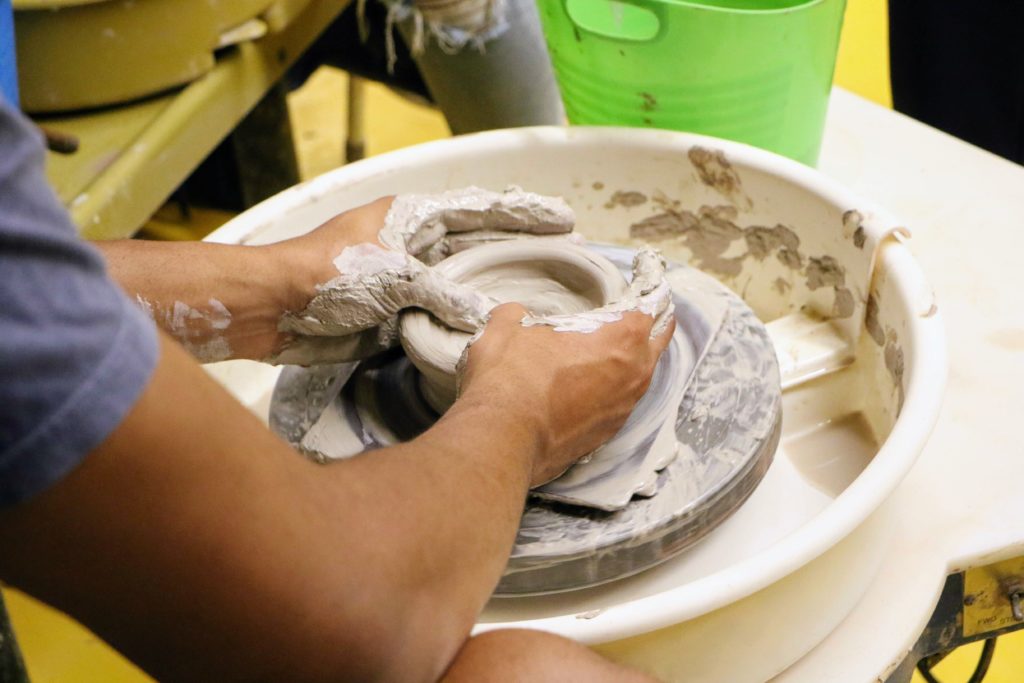
“EJ, you need to step your game up, dude,” Kelly joked at one point. “I’ll say stuff, and people are like, ‘What?’”
His earliest exposure to ceramics occurred at Pace Academy. Kelly moved from Augusta, Ga. to Atlanta before enrolling at Pace for the start of his sophomore year of high school. On the first day of school, ceramics was his first-period class, and he sat down at the wheel with no idea what to do.
Mark Knott, who is in his eighth year as a visual and performing arts teacher at Pace, quickly helped him develop, and while Kelly initially found the process challenging, he grew more comfortable after the first month and even more so by the conclusion of his first semester.
“Second semester, man, he was making really good stuff,” Knott said. “And he really was making, I can’t even stress, he was making a tremendous amount of work, more work than any other kid I’ve ever seen make. He just was a working machine. He’d find stuff online and he could come in and ask me how to make it. He’s a unique kid. You could show him once or talk about it, and he could make it, like just really almost that fast.”
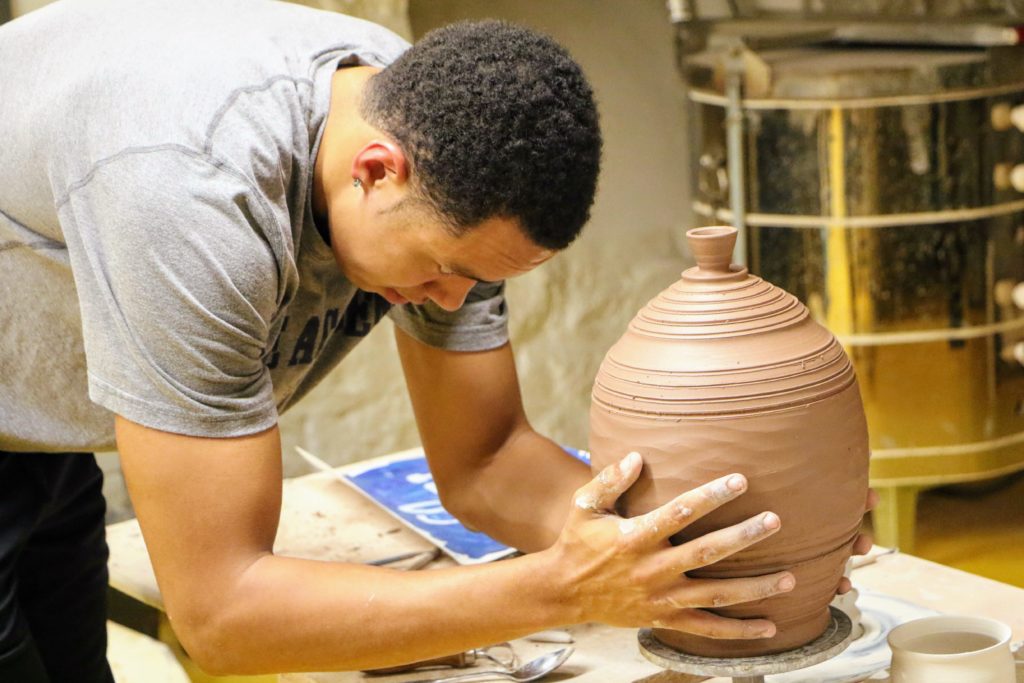
In October 2016, the fall of his junior year, Kelly launched an Instagram account for his art, @isaiahkellyart, and began to post photos of his pieces and timelapses of the process that went into each. By senior year, he was spending about 18 hours a week in the studio, filling any free time he had with a trip to the wheel. Avoiding traffic each morning required him to arrive at school an hour early and offered him time to spend in the studio, where he also migrated during his free periods and early afternoons before basketball practice.
He found an enthusiastic base of customers, too. Kelly launched a website to display his catalogue and began making sales. Knott said the work was so good he could have probably sold it anywhere.
Kelly estimated that he grossed $20,000 by selling art over his three years at Pace. At one fall sale, Knott added, he made a couple thousand dollars in one day. While his primary medium was ceramics, he began to paint during senior year as well.
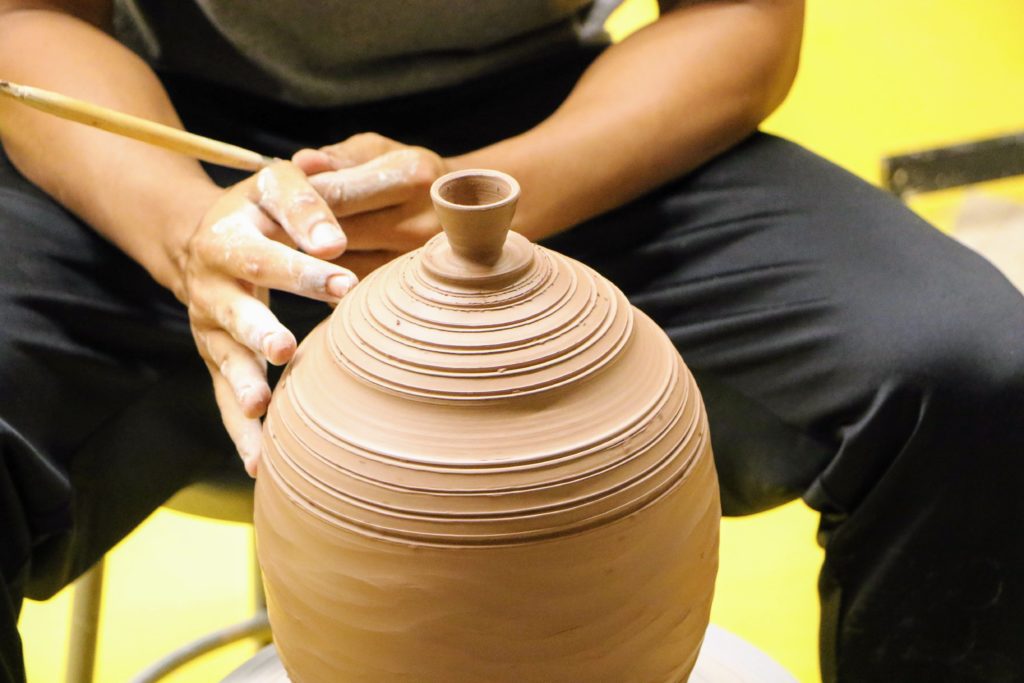
“He would be known at that school for both basketball and his artistic talent, primarily ceramics,” Knott said. “He won some of the top art awards while he was there, which kind of is unheard of with a kid who’s so talented in athletics… He’s got paintings that are still hanging in the hallways. He’s got some paintings that are in faculty classrooms. He’s got ceramic work in some of the show cabinets that are around the school in the new high school.”
At Yale, Kelly has found a way to keep producing art alongside his Division I time commitment to basketball. 247Sports rated him a three-star prospect, and Kelly received offers from Georgia, Memphis, Vanderbilt, Wisconsin, Xavier in addition to Ivy League ones from Brown, Harvard, Penn and Princeton. But in his athletic profile on the Elis’ website, Kelly lists architecture and public art as two of the reasons he committed to play at Yale. He continues to create commissioned pieces and has coordinated with the dining hall managers at Berkeley, his own residential college, as he prepares to create new flower pots for the space this summer.

Last spring, graduate affiliate Chris Geissler GRD ’20 saw his work and reached out to him about becoming a Branford studio assistant. Branford Operations Manager Susan Obert helped finalize the hire. Now, Kelly said he just wants to get as many people to visit as he can, and he has worked to make the studio a fun, easygoing space to learn and relax.
Williams, who had also taken ceramics in high school but had never thrown a pot, laughed recalling the time Kelly tossed around his pot before accidentally dropping it.
“Remember when he was tossing my bowl and shattered it?” Williams asked Jarvis with a smile. “He had the audacity, instead of apologizing, he was like, ‘that’s one of the first lessons my pottery instructor taught me: Never get attached to a piece.’ He was like, ‘you learned a valuable lesson today…’ Thanks, guru.”
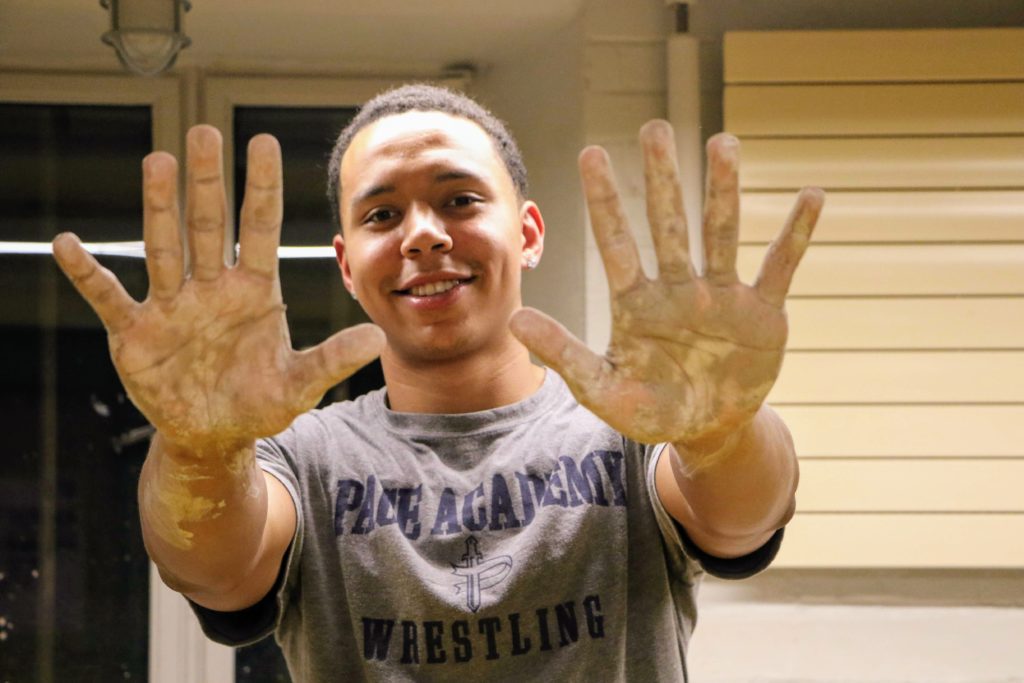
Knott said he thinks the process can be therapeutic, too, a medium to relieve stress and escape whether one is working individually or in a group. He continues to text with Kelly, who reaches out with questions about kilns and technique, and made sure to tune in to Yale’s postseason run last March: the Ivy Madness championship with Harvard and its NCAA Tournament game against LSU.
Both Knott and his student-turned-teacher Kelly hope another postseason run awaits. Yale can clinch an Ivy Madness spot with a win this weekend. But whatever happens then and beyond, Kelly will have his wheel. For him, the process gets philosophical.
“The wheel is like a representation of your life,” he said. “It keeps going. You gotta mold yourself into that final product, and that’s why I think pottery is so cool.”
William McCormack | william.mccormack@yale.edu







